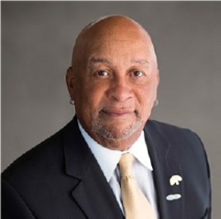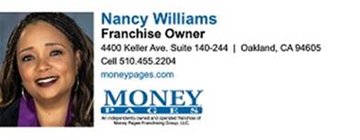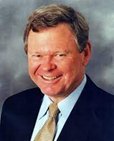Thought For The Day - Jason Wizelman
Jason Wizelman gave us not just one thought for the day but several precious aphorisms from Dr. Martin Luther King, Jr.: only light can dispel darkness; only love can banish hate; threat to justice anywhere is a threat to justice everywhere; the time is always right to do right; and what are you doing for others?
Visiting Rotarians and Guests
Just as Past President & District Governor Ed Jellen bemoaned the absence of guests, Sandeepa Nayak chimed in to say that Pello Walker had joined us, and Ces noted that Dianne Dorn, Past President of the San Leandro Club, was also among the virtual attendees.
Meeting Sponsor – Nancy Williams, Money Pages
Pres. Ces then turned the “mic” over to Nancy Williams, whose advertising firm, Money Pages of Oakland, sponsored today’s meeting. Nancy informed us that Money Pages is a full-service ad agency recently ranked #1 in the marketing field by a major advertising trade journal. The company handles both direct mail and digital advertising; and it has a team who will manage your social media marketing. Money Pages’ client list includes the Oakland A’s, the Oakland Ballet, the Oakland Marathon, and several Club members, including Derreck Johnson (Home of Chicken & Waffles), Jesse Schmidt (TNT Strength), and Ruth Stroup. When invited by Nancy to talk about her client experience, Ruth Stroup said that Money Pages hit a home run in getting the word out about the Shredding Day service that Ruth’s Farmers Insurance agency sponsors once a year.
New Members
Past President David Stein introduced new member Dawnn Hills of the DMH Insurance Group. Her key pastimes include board games and singing. She has an impressive collection of Monopoly games.
David Kersten introduced new member Clive Worsley, the new Director of the Junior Center of Art and Science. Clive was previously with Cal Shakes and, though you wouldn’t guess it from his accent, is a native of Glasgow, Scotland.
Committee & Event Information
Business Development Committee
Jesse Schmidt, Chair of the Business Development Committee, announced that the Committee is filling out the schedule of Thursday Meeting Sponsors for the first six months of 2022. Sign up to be a sponsor. There’s no better way to broadcast your brand to the Club! Jesse ended by reciting a quote from novelist Howard Zinn about the importance of both optimism and good acts when in the midst of a prolonged crisis.
Environment Committee
Joel Parrott took the “mic” as the Chair of the new Environment Committee. Joel reported that the Committee has an initial roster of 12 members, and welcomes others to join the committee. They have a mission statement and plan to soon conduct a survey of all Club members to ascertain our “carbon footprint” in the battle against climate change. If you’re interested in joining, email Joel at jjparrott83@gmail.com.
Lunar New Year Celebration
Danny Mai announced this year’s Club festivity for the upcoming Year of the Tiger Lunar New Year will be an online “virtual” dinner starting at 4:30 p.m. on February 3. On the menu are delicious Japanese bento box servings from Sakura Bistro Tapas & Sake Bar in Oakland. A single dinner runs $30 including tax & tip, and you can either pick the dinner up at the California Ballroom or have it delivered to your home. Be sure to make your online reservation on the Club’s website ASAP before the February 1 deadline. Contact Danny Mai at dmai@novateckit.com or Pres. Elect Mary Geong at mmgeong@aol.com if you have questions.
Speaker for the Day - Roy Neel
Past President David Stein introduced our speaker Roy Neel, a distinguished Professor of Political Science at Vanderbilt University. David noted that Prof. Neel has had major responsibilities in the political realm, including roles in the Clinton Administration, management of Al Gore’s 2000 Presidential campaign, and recent Presidential transitions, including the controversial “hanging chad” debacle that plagued the 2000 election. He is also the author of a novel called The Electors, which addresses the pitfalls of the existing Electoral College system. These were his observations:
1) The U.S. Supreme Court recently ruled a state can enact a law that binds an elector to vote for the Presidential candidate to whom he is pledged under state law. Thus, the “faithless elector” problem, which occasionally arises when an elector changes his vote to a different candidate has been resolved – at least for states that have passed the requisite “binding” legislation.
2) On Jan. 6, 2021, there was an overt attempt by certain members of Congress to challenge the certified votes of several states’ slates of Electors. Had they succeeded, Joe Biden would have had fewer than the 270 Electoral College votes needed to win, and the outcome would have been decided by the House of Representatives. There is a pending bipartisan bill that would foreclose future post-certification challenges by confirming that Congress’ must accept the Electoral College votes that are certified by a state.
3) If no candidate receives the requisite 270 Electoral College votes, the subsequent vote in the House is highly undemocratic. This is because a single vote is allocated to each state’s House delegation. Thus, the vote cast by Wyoming’s single representative would be given the same weight as the prevailing vote of California’s 50 plus representatives! The Founding Fathers agreed to this “one vote for each state” arrangement in order to placate the less populated states.
4) It would take a constitutional amendment to eliminate the one-vote-for-each-state rule. However, due to the high vote thresholds for such an amendment, it is highly unlikely that it could pass over the opposition of the small states and their Republican Congressmen. The only viable path to an amendment may require a massive episode of Electoral College corruption that engenders widespread popular demands for reform.
5) Some Democratic states, including California, have entered into a compact that purports to minimize the risk of a Presidential election being decided in the House due to any candidate failing to garner 270 or more Electoral College votes. The compact commits each of the signatory states to allocating all of their Electoral College votes to the candidate who wins the state’s popular vote.
6) Another major problem with the current system is the language in the Constitution allows each state to govern the state’s process for conducting Presidential (and other federal) elections. Since the 2020 election, 19 states have passed laws that effectively suppress the vote, especially in low-income communities. Eight of these states have made legislative changes that transfer vote certification authority from independent commissions to partisan state legislators. These changes will bolster the Republican takeover of state and local offices. They also ominously increase the likelihood that future Presidential elections will be decided by the House under the current one-vote-for-each state rule. Note that the pending bipartisan effort to curtail Congress’ alleged authority to disregard a state’s certified Electoral College votes would have no effect on a state’s ability to cancel popularly elected outcomes by means of these recent state law changes.
7) In response to questions from “the floor”, Prof. Neel said: A) He disagrees with commentator David Brooks’ assertion that studies have shown that state voting restrictions have no impact on actual voting. Consider, e.g., the effect of “poll tax” and similar laws enacted in the post-Reconstruction South and the obvious impact of more recent laws that curtain early voting options that many people need to exercise their voting rights. B) There are no federal voting audit rules. Any audits are done at the state level. C) Most people do not understand how the Electoral College process works. Among other things, we need to include better civic education in school curricula. D) If the Democrats succeed in passing a federal election reform bill, it could be repealed by a future Republican Congress, but would face a higher burden of proof. E) As Republicans have already done, Democrats need to become more engaged in filling state and local political offices.
Bellringers
Ruth Stroup rang the bell for Nancy Williams & Money Pages.
Lois Corrin rang the bell for Martin Luther King, Jr., then offered a touching anecdote about meeting Dr King when she was a child.
Ana-Marie Jones rang the bell for Ruth Stroup.
David Stein rang the bell for Roy Neel.
Adjournment
President for the Day Ces adjourned the meeting at 1:31 p.m





Add new comment